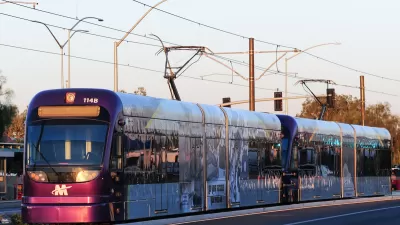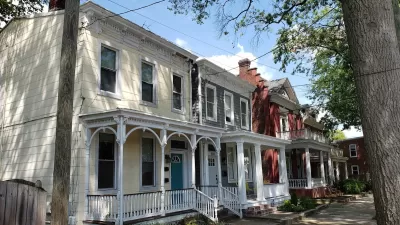We've covered a wide variety of ballot measures that appeared on the Nov. 4, 2014 ballot. While the media has focused greatly on Congressional and gubernatorial outcomes, we'll look at the results of the state and local measures we've covered here.
Of the ballot measures we covered, the Massachusetts voter initiative to roll back inflation-adjustment of the state gasoline excise tax was arguably the most important.
A decisive loss for sustainable gas tax funding—53 percent voting in support (to roll back indexing) and 47 percent opposed (retain indexing), reports WPRI. What does the vote to toss gas tax indexing portend for increasing state gas taxes? Read more in T4America, Governing, Politico Morning Transportation and Streetsblog.
Results on Louisiana, Maryland and Wisconsin Transportation Measures:
- Louisiana: WGNO reports: "Amendment No. 4 the Investment of Public Funds failed with 68 percent of voters saying no Tuesday. The amendment would have allowed the state to invest public money in an infrastructure bank for eligible transportation projects.
- Maryland: Ballotpedia notes that Question 1, "a legislatively-referred constitutional amendment, was approved. It provides for the establishment of a constitutionally-defined transportation trust fund and requires that revenues in the fund be used for paying transportation-related bond debt and for the construction and maintenance of highways."
- Wisconsin Ballotpedia reports: "Question 1, a legislatively-referred constitutional amendment, was approved. The measure required that revenue generated by transportation fees and taxes be deposited into the state's transportation fund. According to the amendment, none of the revenue collected from transportation-related levies could be appropriated to any program that is not directly administered by the Wisconsin Department of Transportation.
The Rhode Island Transit Measure to approve authorizing $35 million for Mass Transit Hub Infrastructure Bonds won with 60 percent of the vote, reports the Center for Transportation Excellence.
In Texas, where voters decided whether to allow oil and gas tax revenue to fund roads, Daniel C. Vock of Governing reports that "Proposition 1 passed overwhelmingly, with 80 percent of voters supporting the measure late Tuesday night."
A controversial conservation ballot in North Dakota was rejected, reports Vock.
Environmental groups spent nearly twice as much money as their opponents to set aside some oil revenue for protecting the land, but the ballot measure lost by a landslide.
In California, Governor Jerry Brown's signature $7.5 billion water bond won passage, reports the Sacramento Bee. "Voters were backing Proposition 1 by 67.5 percent to 32.5 percent with 35 percent of precincts reporting."
Moving on to local measures, a Seattle bus funding initiative was approved. "Originally conceived as a way to preserve bus service slated for cuts, then repackaged as a means to fund additional transit hours, the ballot measure was ahead 58.8 percent to 41.1 percent as of 8 p.m. on Tuesday," reports Crosscut.com. The initiative was devised after a King County bus funding initiative failed due to the high proportion of suburban voters.
In San Francisco, Ben Fried of Streetsblog reports that "voters reject (Measure L) to enshrine free parking and stop livable streets." 62 percent of voters rejected Measure L.
In California, three counties had oil drilling bans on the ballot. Ballotpedia reports that the "Santa Barbara County Fracking Ban Initiative was defeated."
However, voters in San Benito and Mendocino counties in California passed ballot measures to restrict fracking, as they did in Denton, Texas and Athens, Ohio, writes Timothy Cama in The Hill.
Look for forthcoming analysis on the outcome of the fracking ban measures as well as other election results.
FULL STORY: Important transportation ballot measures decided yesterday

Alabama: Trump Terminates Settlements for Black Communities Harmed By Raw Sewage
Trump deemed the landmark civil rights agreement “illegal DEI and environmental justice policy.”

Study: Maui’s Plan to Convert Vacation Rentals to Long-Term Housing Could Cause Nearly $1 Billion Economic Loss
The plan would reduce visitor accommodation by 25% resulting in 1,900 jobs lost.

Why Should We Subsidize Public Transportation?
Many public transit agencies face financial stress due to rising costs, declining fare revenue, and declining subsidies. Transit advocates must provide a strong business case for increasing public transit funding.

Paris Bike Boom Leads to Steep Drop in Air Pollution
The French city’s air quality has improved dramatically in the past 20 years, coinciding with a growth in cycling.

Why Housing Costs More to Build in California Than in Texas
Hard costs like labor and materials combined with ‘soft’ costs such as permitting make building in the San Francisco Bay Area almost three times as costly as in Texas cities.

San Diego County Sees a Rise in Urban Coyotes
San Diego County experiences a rise in urban coyotes, as sightings become prevalent throughout its urban neighbourhoods and surrounding areas.
Urban Design for Planners 1: Software Tools
This six-course series explores essential urban design concepts using open source software and equips planners with the tools they need to participate fully in the urban design process.
Planning for Universal Design
Learn the tools for implementing Universal Design in planning regulations.
Smith Gee Studio
Alamo Area Metropolitan Planning Organization
City of Santa Clarita
Institute for Housing and Urban Development Studies (IHS)
City of Grandview
Harvard GSD Executive Education
Toledo-Lucas County Plan Commissions
Salt Lake City
NYU Wagner Graduate School of Public Service





























